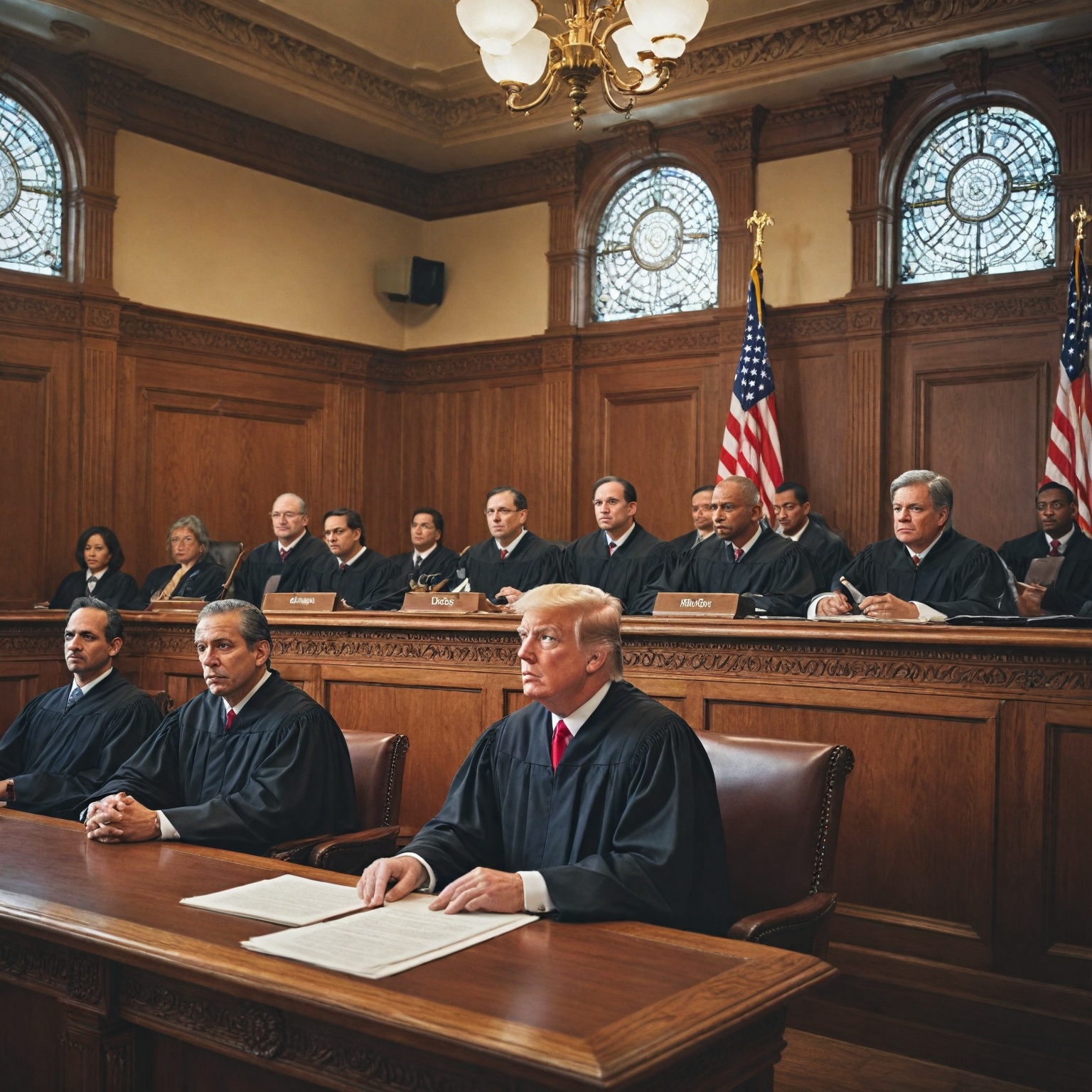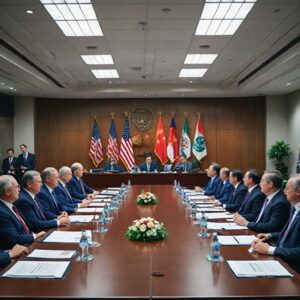Summary
The Appeals Court Upholds Block on Trump Administration’s Indiscriminate Immigration Policy is a significant legal ruling that halted key enforcement measures implemented during the Trump administration’s stringent immigration crackdown. Centered on a series of policies aimed at expediting deportations and restricting due process protections for migrants—particularly those from countries such as Cuba, Nicaragua, Venezuela, and Haiti—the court’s decision affirmed judicial oversight over executive immigration actions and reinforced procedural safeguards for individuals facing removal from the United States.
The Trump administration’s immigration strategy included aggressive measures such as the controversial family separation policy, expedited deportations often conducted using military resources, and the invocation of the Alien Enemies Act of 1798 to target certain immigrant populations with curtailed legal rights. These policies provoked widespread legal challenges on grounds that they violated constitutional due process protections and federal immigration law. The appeals court’s ruling upheld preliminary injunctions that blocked the government’s attempts to remove immigrants without adequate opportunity to contest their deportations, signaling a judicial check on what critics characterized as executive overreach.
This judicial resistance to the Trump administration’s immigration agenda is part of a broader pattern of courts intervening to protect immigrant rights amid efforts to curtail asylum claims, rescind work permits, and impose harsh enforcement tactics. While the Supreme Court has at times sided with the administration on related issues, lower federal courts have repeatedly maintained injunctions and halted policies that threatened to undermine legal standards and civil liberties for both non-citizens and lawful permanent residents.
The ruling’s impact extends beyond immigration enforcement, emphasizing the constitutional limits of executive authority and the importance of due process. Advocates and legal experts hailed the decision as a critical safeguard against arbitrary detention and deportation, while critics warned that the Trump administration’s approach risked eroding fundamental civil rights. The case underscores ongoing tensions between national security considerations, humanitarian obligations, and the rule of law in U.S. immigration policy.
Background
The Trump administration implemented a series of stringent immigration policies aimed at deterring illegal immigration, including the controversial family separation policy from 2017 to 2018. This policy, presented as part of a “zero tolerance” approach, resulted in migrant children being separated from their parents or guardians, even in some cases where families followed legal asylum procedures at official border crossings. The administration also pursued mass deportations, utilizing military aircraft to expedite the removal of detained migrants, reflecting a cornerstone of Trump’s immigration strategy to remove unlawful migrants from the United States.
Several executive actions during this period sought to overhaul the immigration court system and expedite deportations. For example, the Executive Office for Immigration Review (EOIR) issued new rules altering procedures within immigration courts, particularly affecting the Board of Immigration Appeals. The administration also invoked the Alien Enemies Act of 1798 to accelerate deportations of certain gang members with reduced due process, a move that sparked multiple lawsuits and was temporarily blocked by the Supreme Court. Critics warned that these measures eroded due process protections for immigrants, potentially threatening the rights of lawful permanent residents and U.S. citizens.
Legal challenges emerged against various Trump administration policies, including efforts by several states to enforce laws criminalizing illegal immigration that conflicted with federal law. Federal judges repeatedly blocked such state efforts, reaffirming federal supremacy in immigration matters. Moreover, courts issued rulings against attempts to curtail asylum claims, with federal judges striking down categorical denials of asylum implemented early in the Trump presidency. The administration’s efforts to revoke legal status and work permits of hundreds of thousands of immigrants were also halted by appellate courts.
The family separation policy and other enforcement practices faced ongoing scrutiny and litigation. While the policy officially ended in mid-2018, journalists and advocates continued investigating its impacts, emphasizing that many aspects remained unclear or unresolved. Lawsuits were filed against government agencies and individual officials involved in family separations, yet efforts to hold those responsible accountable have been limited. Despite changes under subsequent administrations, family separations and detentions have persisted as part of broader interior immigration enforcement practices.
Court Proceedings
On June 4, 2025, the district court granted in part the petitioners’ motion for a preliminary injunction, ruling that the government must facilitate the class’s ability to seek habeas relief to contest their removal under the Alien Enemies Act (AEA). Following this decision, the government filed an appeal, which remains pending before the D.C. Circuit Court.
Subsequently, on March 26, 2025, a divided panel of the D.C. Circuit Court denied the government’s motion to stay the district court’s temporary restraining order (TRO), allowing the injunction to remain in place. The court recognized the complexity of the case, noting jurisdictional questions about whether the district court has authority beyond contempt powers to address removals conducted under the AEA, particularly for individuals no longer present in the country. The court emphasized that temporary restraining orders are generally not appealable unless they risk causing irreparable harm, which influenced their decision to maintain the TRO.
The federal appeals court’s decision was hailed by advocates as a significant protection for hundreds of individuals, preventing their removal to foreign detention facilities without due process. This ruling effectively maintained the status quo, blocking the administration’s attempts to implement its removal policy indiscriminately.
Additionally, related appeals have seen similar outcomes, with various federal appellate courts denying the Trump administration’s efforts to stay injunctions that protect immigrant populations from abrupt revocation of legal statuses or removal. These judicial decisions collectively underscore the ongoing legal resistance to the administration’s immigration enforcement strategies.
Appeals Court Decision
The First Circuit Court of Appeals played a pivotal role in upholding judicial checks on the Trump administration’s immigration policies. In a notable ruling, the court denied the administration’s request to stay a district court decision in Svitlana Doe v. Noem, which had halted the government’s attempt to revoke the legal status and work permits of hundreds of thousands of individuals residing in the United States. This decision underscored the judiciary’s resistance to what was perceived as an overreach in immigration enforcement practices.
The court’s ruling reflected broader concerns about due process and the rule of law. Critics emphasized that the administration’s aggressive tactics—such as removing individuals from the country without adequate legal procedures—posed significant risks to fundamental civil liberties. One commentator warned that permitting such actions without remedy could encourage even more severe executive measures with little judicial oversight. Legal advocates highlighted that the judiciary continued to protect individuals’ rights despite persistent attacks from the administration aimed at undermining court orders.
At the core of the appeals court’s jurisdiction was the recognition of constitutional limits on executive authority in immigration enforcement. While the government maintained broad powers to regulate immigration, particularly in matters involving national security, courts have consistently held that these powers are not absolute when applied to individuals already present in the United States. Notably, precedent dictates that prolonged detention or deportation without due process raises serious constitutional concerns. This judicial balance was evident in ongoing litigation involving lawful permanent residents like Mahmoud Khalil, whose detention based on immigration charges was challenged on constitutional grounds.
The case also demonstrated alternative judicial remedies available beyond universal injunctions. Courts, guided by statutes such as the Administrative Procedure Act (APA), have the authority to invalidate agency actions deemed arbitrary or contrary to law, providing a check on executive policies without necessitating sweeping nationwide bans. However, challenges remain regarding jurisdictional limits, particularly in interlocutory appeals where temporary restraining orders are generally not appealable unless exceptional circumstances exist.
Effects of the Decision
The appeals court’s decision to uphold the block on the Trump administration’s broad immigration policy has significant implications for migrants, the administration’s enforcement capabilities, and the broader legal landscape surrounding immigration in the United States. By siding with earlier rulings that sought to provide migrants from countries such as Cuba, Nicaragua, Venezuela, and Haiti with meaningful opportunities to challenge their deportations, the court effectively curtailed the administration’s attempts to expedite removals without due process.
This ruling marks a critical check on the executive branch’s use of emergency orders and wartime statutes to bypass established immigration protections. Legal experts and immigrant advocacy groups have highlighted concerns that the policy disproportionately affected vulnerable populations, including the poor and uneducated, who often lack adequate legal representation and thus become subject to the executive’s discretion without recourse. The decision signals judicial recognition of these due process concerns, emphasizing the necessity of maintaining procedural protections for non-citizens facing deportation.
The ruling also fits into a broader pattern of judicial resistance to the Trump administration’s immigration agenda, which has faced multiple legal setbacks related to family separations, asylum restrictions, and temporary protected status protections. While the conservative-majority Supreme Court has sided with the Trump administration in other cases, allowing for certain policy rollbacks, this decision exemplifies ongoing judicial scrutiny aimed at ensuring immigration enforcement does not violate constitutional or statutory rights.
From a policy perspective, the decision disrupts the administration’s goal of conducting mass deportations using military assets and increased detention capacity. Despite aggressive efforts to remove thousands of migrants rapidly, including the use of military aircraft for deportations in border areas, this ruling restricts such measures by preserving migrants’ ability to contest their removal based on credible fears of persecution or torture. It underscores the challenge of balancing enforcement priorities with humanitarian and legal obligations.
Finally, the decision has broader ramifications for the rule of law and the separation of powers. It reinforces the judiciary’s role in upholding constitutional protections against executive overreach in immigration enforcement and cautions against the misuse of historical statutes to evade legal scrutiny. Critics of the administration’s approach argue that weakening due process rights sets a dangerous precedent not only for non-citizens but potentially for lawful permanent residents and U.S. citizens as well, as it threatens to erode fundamental civil liberties. Thus, the ruling is both a defense of immigrant rights and a reaffirmation of legal norms that constrain governmental power.
Reactions
The ruling by the appeals court to uphold the block on the Trump administration’s immigration policy elicited a range of responses from legal experts, immigrant rights advocates, and journalists closely following the issue. Advocates highlighted the decision as a crucial safeguard against arbitrary detention and an affirmation of fundamental rights. Matt Adams, legal director of the Northwest Immigrant Rights Project, remarked that the court’s decision “upholds a fundamental right protecting people from arbitrary detention,” underscoring the legal significance of the ruling.
Organizations such as the American Civil Liberties Union (ACLU) expressed cautious optimism, viewing the decision as part of a broader effort to dismantle the Trump administration’s harsh immigration measures. Cody Wofsy, staff attorney with the ACLU’s Immigrants’ Rights Project, stated that the rulemaking process instigated by the decision “will result in further progress toward a fair and humane asylum policy” and called on the Biden administration to accelerate efforts to undo previous administration damage. The ACLU, along with Democracy Forward and the ACLU of the District of Columbia, had actively challenged the administration’s invocation of the Alien Enemies Act in federal court, filing emergency lawsuits to halt removals.
Journalists who reported on the family separation policy and other related immigration enforcement actions have emphasized the ongoing complexity and human impact of these policies. Caitlin Dickerson, a journalist who covered immigration during the Trump administration, noted the difficulty in reconciling official government narratives of humane enforcement with firsthand accounts from border patrol agents and affected families. She highlighted that despite widespread public awareness, many aspects of the family separation policies remained poorly understood even after the administration ended the zero tolerance policy, and that accountability for those responsible had yet to be fully pursued.
These reactions collectively reflect continued concern over immigration enforcement policies and a demand for increased transparency, accountability, and humane treatment of migrants, as well as cautious support for judicial interventions that seek to protect immigrant rights.
Subsequent Developments
Following the initial rulings against the Trump administration’s immigration policies, ongoing legal battles and judicial decisions have continued to shape the landscape of U.S. immigration enforcement. Experts have raised concerns that these actions undermine the limited due process rights afforded to immigrants, with some warning of a potential erosion of legal protections even for lawful permanent residents and U.S. citizens. Muzaffar Chishti of the Migration Policy Institute described the trend as a “slippery slope” toward restricting judicial oversight over residents in the country. Furthermore, recent emergency orders by the Supreme Court have exposed migrants from countries such as Cuba, Nicaragua, Venezuela, and Haiti to heightened risk of deportation, reflecting a conservative majority that appears inclined to uphold aspects of the Trump administration’s immigration agenda.
Despite these judicial developments, critics emphasize the constitutional and legal challenges inherent in many Trump-era policies. The experience from 2017 to 2021 demonstrated the importance of litigation in blocking numerous policies including family separations, asylum restrictions, and efforts to rescind protections under Temporary Protected Status (TPS) and Deferred Action for Childhood Arrivals (DACA). Courts have continued to act in some cases to protect immigrant rights; for example, a federal judge in Massachusetts ordered the resumption of processing applications for humanitarian parole beneficiaries, and the Ninth Circuit upheld orders compelling funding for legal services for unaccompanied immigrant children.
At the same time, some rulings have stalled enforcement of Biden-era immigration policies aimed at reversing Trump-era measures. For instance, the Supreme Court temporarily stayed a federal judge’s ruling that would have allowed immigrants at risk of persecution to bring claims before deportation to third countries under newly established agreements. This complex interplay highlights the tension between executive immigration authority—traditionally broad under long-standing Supreme Court precedent—and the judiciary’s role in safeguarding due process rights for immigrants physically present in the United States.

























